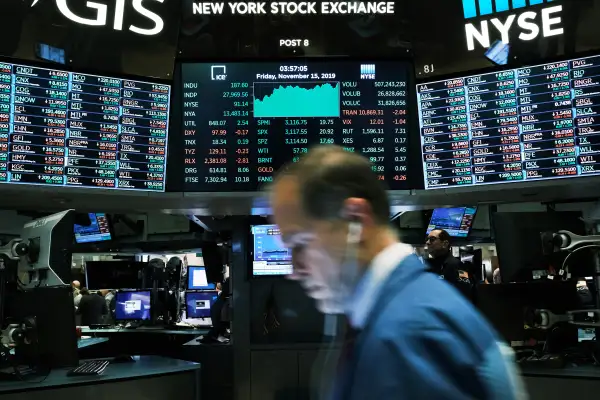Why Stocks Are Bouncing Back Despite Fears a Recession Is Coming
Money is not a client of any investment adviser featured on this page. The information provided on this page is for educational purposes only and is not intended as investment advice. Money does not offer advisory services.

Despite still-high inflation and fears of a looming recession, stocks made a major comeback in October.
The S&P 500 and Nasdaq Composite ended the month up about 8% and 3.9%, respectively. The Dow Jones Industrial Average, meanwhile, climbed 14% for its best month since 1976.
The gains come amid what's been a tough year for financial markets. To fight sky-high inflation, the Federal Reserve has been hiking interest rates, and another increase is expected this week. Interest rate hikes can help rein in spiraling prices, but they can also weigh on the price of financial assets, like stocks, bonds and crypto — an effect we've seen play out this year.
Last week, investors got some good news: The U.S. economy grew 2.6% during the third quarter. But overall, experts still say a recession is a very real possibility.
Here's why stocks can keep rising despite worries of an economic downturn.
The stock market is not the economy
While they're often paired together when talking about money, the stock market is very different from the economy. The economy refers to the production and consumption of goods and services in the U.S., while the stock market represents an exchange in which investors can buy and sell shares of publicly-held companies.
"It is wrong to assume that the economy and stock markets are one and the same," says Robert Conzo, CEO and managing director of The Wealth Alliance. "However, over longer periods of time, the economy and stock markets tend to have a strong correlation with one another."
That's where the confusion comes in. A well-performing stock market tends to go hand in hand with a healthy economy. But this isn't always the case — in fact, this year good economic news has sometimes hurt stocks — so investors shouldn't look at the economy and the stock market as interchangeable.
Markets are forward looking
Markets don't rise or fall based on how the economy has done this past year. In fact, they're hardly even focused on how the economy is doing now.
The stock market is forward looking, meaning that valuations reflect how companies are expected to do in the future.
"[Markets] already have priced in a recession and now have begun to price in a potential recovery, especially when the data suggests a more mild recession," says Gene Goldman, chief investment officer at Cetera Investment Management.
Investors are watching the Fed
Markets can rally for a variety of reasons, says Sam Stovall, chief investment strategist at CFRA Research. One reason is that investors change their assumptions about will come next, like that the Fed could wind up raising rates by only 50 basis points in December rather the 75 basis points expected earlier.
Many experts are seeing this as a real possibility, and Paul McCulley, the former chief economist at investment management company PIMCO told CNBC Monday he believes the expectations for a 50-basis-points raise later this year is why markets have been rallying.
Mark Haefele, chief investment officer at UBS Global Wealth Management, agrees.
"We attribute most of the move to hopes that the Federal Reserve might begin to dial back the pace of its rate hikes and technical factors related to already cautious investor positioning," Haefele wrote in a research note Monday.
Other factors that can cause rallies are a market being in a decline for too long — as in, investors think it's oversold — and seasonality, Stovall says. Despite being known for high volatility, October has historically been a positive month for stocks overall.
Will markets continue to rally?
While no one has a crystal ball that accurately predicts the future, investors are closely watching the Federal Reserve.
On Wednesday, the Fed is expected to announce another rate hike, and investors will be listening for a hint at what to expect from the December meeting as well.
"Wednesday’s message will be crucial for market expectations going forward," Quincy Krosby, chief global strategist for LPL Financial said via written commentary shared with Money on Monday. "Chairman Powell will need to convince traders and investors alike that the Fed is still resolutely determined to curtail inflation, but that it can be accomplished with a steady dose of lower rates."
More from Money:
Most U.S. CEOs Think a Recession (and Layoffs) Are on the Horizon
Don't Panic: 7 Expert Tips for Managing Stock Market Volatility

